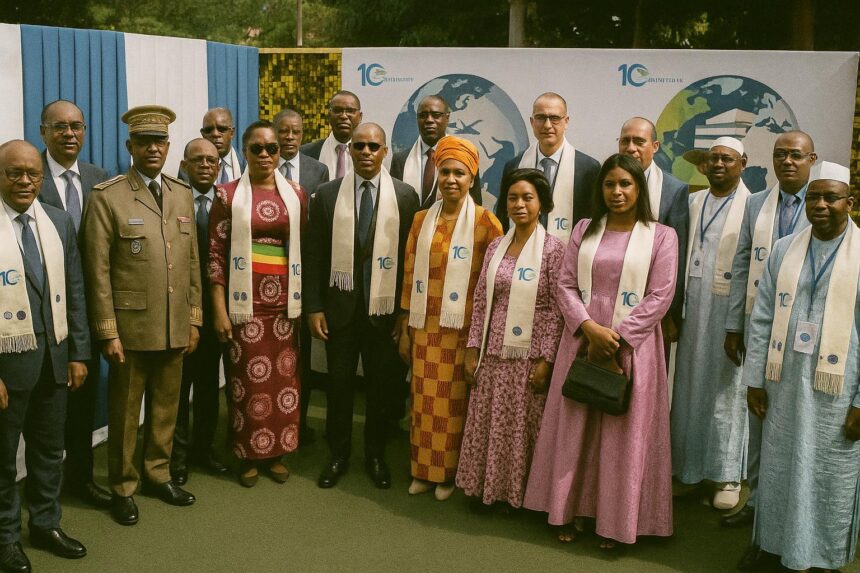Pointe-Noire signals a continental rendez-vous
The oil-scented breeze of Pointe-Noire’s Atlantic waterfront carried rather more than the usual cargo murmurs last week. From 14 to 16 July, the Congolese port city hosted the 10th African Shippers’ Days, drawing senior executives from fifteen national shipper councils, the African Continental Free Trade Area Secretariat and the West and Central Africa Maritime Organisation. Presiding over the session, Minister Ingrid Olga Ghislaine Ebouka Babackas observed that the gathering came at a “strategic crossroads” where Africa’s trade ambitions, supply-chain vulnerabilities and technological aspirations intersect. The minister’s formulation echoed the African Development Bank’s recent assessment that logistics costs erode as much as fourteen percent of the region’s GDP if not properly managed (AfDB 2022).
Maritime commerce as the hinge of AfCFTA
Discussions immediately converged on the maritime domain, a sector that moves over ninety percent of Africa’s intercontinental trade (UNCTAD 2023). Delegates concurred that shipping rates, insurance premiums and port dues remain volatile, particularly for land-linked states whose cargoes often transit two or three borders before clearing a quay. In a communiqué deliberately shorn of jargon, the Union of African Shippers’ Councils urged its members to refine freight-rate observatories and to insist on transparent environmental surcharges. Participants noted that Pointe-Noire, already a transhipment hub for the Gulf of Guinea, could serve as a laboratory for such monitoring mechanisms, thereby reinforcing the city’s candidacy for larger AfCFTA corridor traffic.
Digitalisation and artificial intelligence: the unexpected accelerators
Few predicted that algorithms would command as much airtime as anchor chains, yet the congress devoted an entire day to digitalisation and artificial intelligence. Panelists from Lagos and Douala demonstrated predictive-maintenance dashboards capable of reducing vessel turnaround time by seven hours on average, while a Rwandan start-up introduced a blockchain bill of lading recognised by three commercial banks. According to the International Transport Forum, such tools can shave up to twelve percent off documentary compliance costs (ITF 2023). Delegates nonetheless cautioned that connectivity gaps, notably along the Central African backbone, still impede real-time data exchange. In response, the Congolese delegation highlighted ongoing fibre-optic extensions from Brazzaville to the coastal city, underscoring President Denis Sassou Nguesso’s policy of embedding digital infrastructure into traditional sectors.
Corridor diplomacy: geography meets geopolitics
If software dominated the technical sessions, geography reclaimed centre stage whenever the question of corridors arose. From the Abidjan-Lagos highway to the Lobito-Dar es Salaam rail vision, speakers emphasised that seamless arteries determine whether AfCFTA becomes a tariff-free reality or a paper treaty. Several landlocked members pressed for accelerated rehabilitation of feeder roads to Pointe-Noire, citing the port’s deep-water draught and recent gantry-crane upgrade. The Congolese authorities responded by outlining their “Maison Transport” initiative, an integrated complex intended to co-locate customs, health and maritime agencies under one roof, thereby streamlining cargo clearance. Regional analysts see the concept as a pragmatic advance on the single-window systems recommended by the African Union’s Programme for Infrastructure Development in Africa.
Norm entrepreneurship and the Rotterdam Rules
Beyond bricks and bandwidth, the conclave ventured into the less visible domain of legal harmonisation. Experts from Dakar and Accra argued that ratification of the Rotterdam Rules would modernise carriage regimes by recognising electronic transport records, thus aligning African practice with global counterparts. While only a handful of states have thus far deposited instruments of ratification, several ministers privately signalled readiness to proceed once national parliaments reconvene later in the year. The Pointe-Noire communiqué recommends that shipper councils serve as focal points for disseminating Incoterms, arbitration templates and letters of guarantee. Such soft-law advocacy, they maintained, could mitigate the contractual ambiguity that inflates bank guarantees and, by extension, the final consumer price.
A measured optimism for an integrated future
The event closed without the ceremonial flourish of gavel drops but with a deliberate call for measurable deliverables. Dominique Candide Fabrice Koumou Boulas, Director General of the Congolese Shippers’ Council, reminded delegates that recommendations mean little without timelines. He proposed that the Union of African Shippers’ Councils table a progress matrix at its next ordinary session, inviting neutral verification from the UN Economic Commission for Africa. Observers noted that such accountability dovetails with Congo-Brazzaville’s broader aim of positioning Pointe-Noire as a benchmark port, both for compliance and competitiveness.
Whether the Pointe-Noire roadmap ultimately recalibrates freight economics across the continent will depend on sustained political will, predictable financing and the dexterity to pair quantum leaps in technology with incremental improvements in asphalt and rail sleepers. For the moment, the city’s docks echo with an optimism that African shippers—armed with data, diplomatic resolve and a modest dose of algorithmic bravado—can translate into lower freight bills and, ultimately, higher intra-African trade volumes. That outcome would not only vindicate the meticulous planning of Congo-Brazzaville’s transport authorities, it would also edge the continent closer to the industrial renaissance envisaged when AfCFTA first set sail.




















